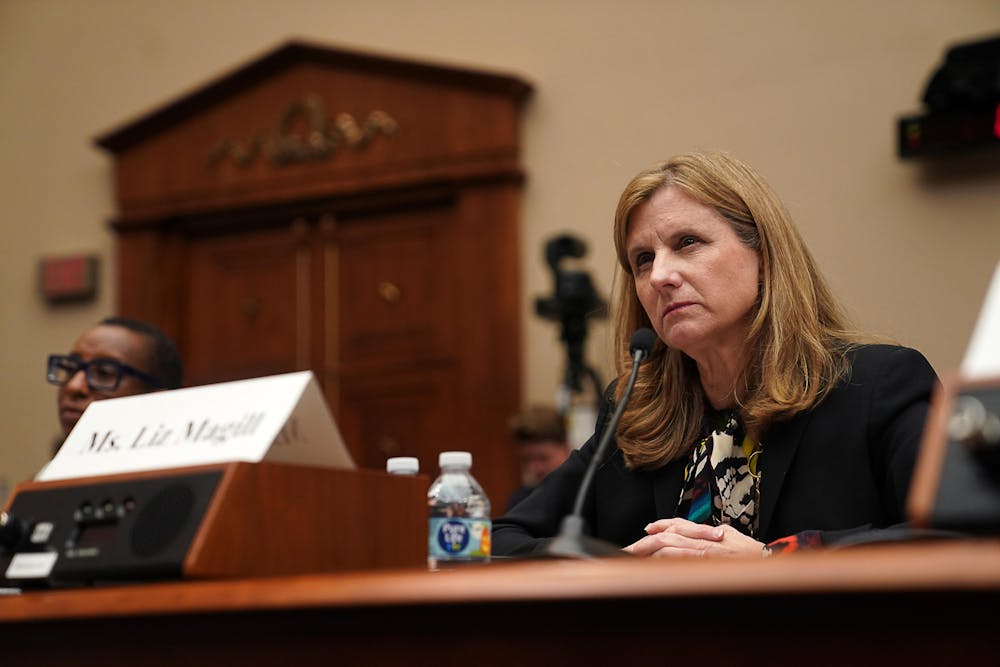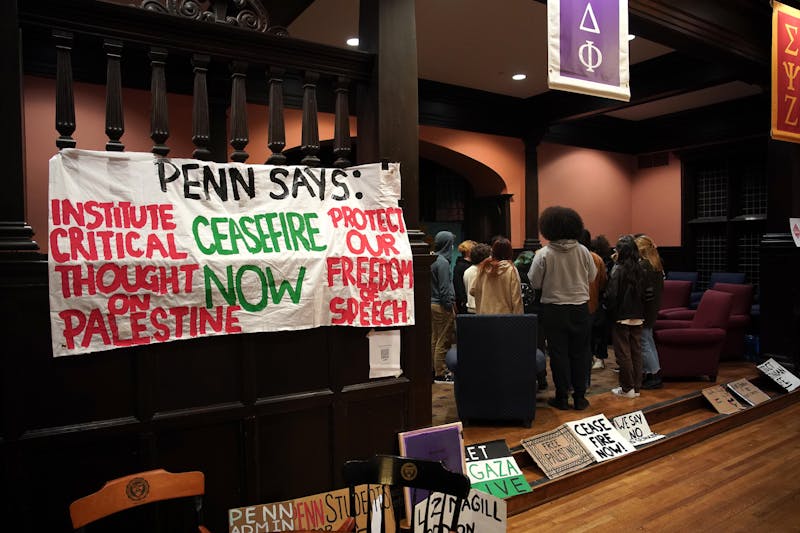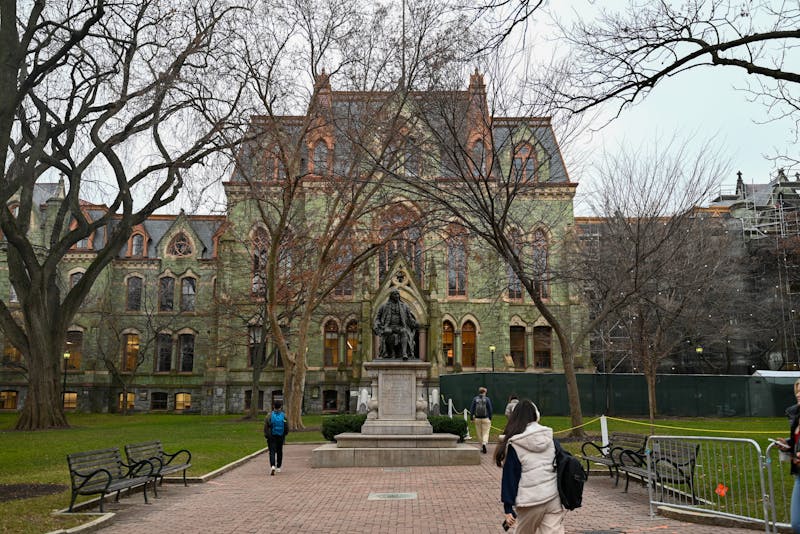
Liz Magill testified in front of Congress on Dec. 5, 2023.
Credit: Anna VazhaeparambilLast month, former Penn President Liz Magill resigned due to controversial remarks related to Palestinian activism on campus. This so-called resignation follows a tumultuous sequence of events, many of which The Daily Pennsylvanian and other media outlets either overlooked or inaccurately portrayed. There were dates and events, such as the Oct. 18 statement, that were not mentioned but played a pivotal role in shaping the discourse surrounding activism on campus. Moreover, some of the wording used to describe the ongoing genocide in Gaza was deemed problematic in the grand scheme of things, highlighting the need for more nuanced discussions and actions.
Magill's actions provoked criticism from both Zionists and supporters of Palestine alike, leading to a cycle where each new comment she made served merely as an apology for the previous one, raising serious questions about her leadership and decision-making abilities.
She began by condemning antisemitism on Sept. 12 in response to the Palestine Writes Festival. When Hamas initiated the attack on Israel from Gaza on Oct. 7, Zionist alumni began financially blackmailing the University due to a lack of action. It wasn't until Oct. 15 that Magill finally issued a statement condemning Hamas. This action put pro-Palestinian protestors at risk, prompting the University to clarify on Oct. 18 that they would support free speech. After Magill had the opportunity to meet with other student groups on campus, she issued another statement on Nov. 1, in which she reaffirmed her unwavering condemnation of antisemitism but also superficially mentioned Islamophobia. Ironically, on the same day she paid lip service to Muslims, congressional officials sent a letter accusing Penn of antisemitism. This led to Magill's infamous testimony before Congress and a follow-up apology video, ultimately culminating in her so-called resignation.
From the Palestine Writes Festival to the congressional committee hearing, Magill appeared to be relying on at least some principles, like academic freedom and free speech, to guide her actions effectively. Hence, many found it surprising that she received backlash from Congress, especially Republicans, who often claim to be the saviors of individual rights in the U.S. Moreover, this situation revealed the strength of the Zionist lobby in American education, if it wasn't already evident. However, the more significant issue at hand is her miscalculation, whether intentional or accidental, in responding to Congress's attack on Palestinian activism on campus.
By responding to the committee's question about whether calls for the genocide of Jewish people would violate Penn's policies or code of conduct, Magill made a critical mistake. In doing so, she accepted the premise that genocidal calls were being made on campus in the first place.
Before delving into the specific chants that were misinterpreted, it's important to clarify the context and actual wording of these expressions, as misconceptions can significantly alter their perceived meaning and intent.
"Israel, Israel, you can't hide, we charge you with genocide": Misinformation spread rapidly when a media outlet, which happened to express Zionist viewpoints, misheard protesters chanting this statement as "We want Jewish genocide." However, this allegation was quickly dismissed.
“From the river to the sea, Palestine will be free”: Zionist allies, like the U.S. Department of State, have conflated this chant with calls for the destruction and genocide of Jews. In reality, this conflation is a perspective that Zionists, who can only envision a free and self-determined Palestinian people at the expense of Jewish people in the region, often spread. This interpretation is a projection of the historical strategy of the Zionist project, which was able to establish a Zionist state only at the expense of the Palestinian people. And ironically, Muslims, Christians, and Jews experienced total peace in the region under Islamic rule.
“There is only one solution: Intifada, revolution”: An overarching and ironic theme is that Zionist students at Penn have stated that they feel unsafe due to demonstrations chanting against injustice in the entire Middle East, whether inflicted by Zionists, Saudis, or Emiratis. Many are quickly alarmed by the term "intifada", which Rep. Stefanik inaccurately translated as “genocide”. Similar to the previous chant, the Intifada revolution symbolizes a persistent struggle for freedom and a resistance movement born from the desperate need to reclaim basic autonomy. Many Penn students and others often conflate Intifada with a contextually ignorant interpretation of history, failing to realize that 1) the occupation of Palestine predated the emergence of the Islamic Resistance Movement (Hamas) in 1987 and other resistance groups, and 2) there would be no casualties in the region if the occupation were to end. So, one could argue that supporting an intifada is in the best interest of everyone.
Perhaps what's more interesting is that Magill probably did not hold the opinion I've just expressed regarding the chants being non-genocidal. This would mean that, in her mind, Magill actually supported freedom of speech, even if it meant allowing genocidal chants.
Overall, this situation makes no sense. A university president, who didn't show any real support for Palestine, let alone Hamas, was fired due to alleged antisemitism, influenced by donor pressure and the board's decision. Moreover, the basis of Magill's argument centered on academic freedom and freedom of speech, which ironically might be the only factors keeping Zionism active at a grassroots level on campuses, contrary to the shift in wider public support for a ceasefire and a free Palestine.
These presidents, who have previously labeled these pro-Palestinian chants as antisemitic hate speech and contrary to Penn's values, suddenly refuse to acknowledge this in court. Recently, I was casually browsing Zionist Twitter and TikTok, and it's clear that these events have provided ample ammunition to the Zionist camp. Knowing that the narrative is shifting, they have used these resignations as a red herring to divert attention to antisemitism. As a student and alumni body, it is our collective responsibility to avoid even tacitly portraying the conflict as being on the same level of alleged aggression and oppression experienced on campuses. Moreover, it's crucial to highlight the inconsistency in our institution's morals and interests. They show outrage over alleged “calls for genocide” on campus, yet remain conspicuously silent on actual acts of genocide against Palestinians.
JOHAER JILANI is a 2023 College graduate, holding a B.A. in Neuroscience and Philosophy and an MSc in Biology. His email address is johaer@sas.upenn.edu.
The Daily Pennsylvanian is an independent, student-run newspaper. Please consider making a donation to support the coverage that shapes the University. Your generosity ensures a future of strong journalism at Penn.
Donate












